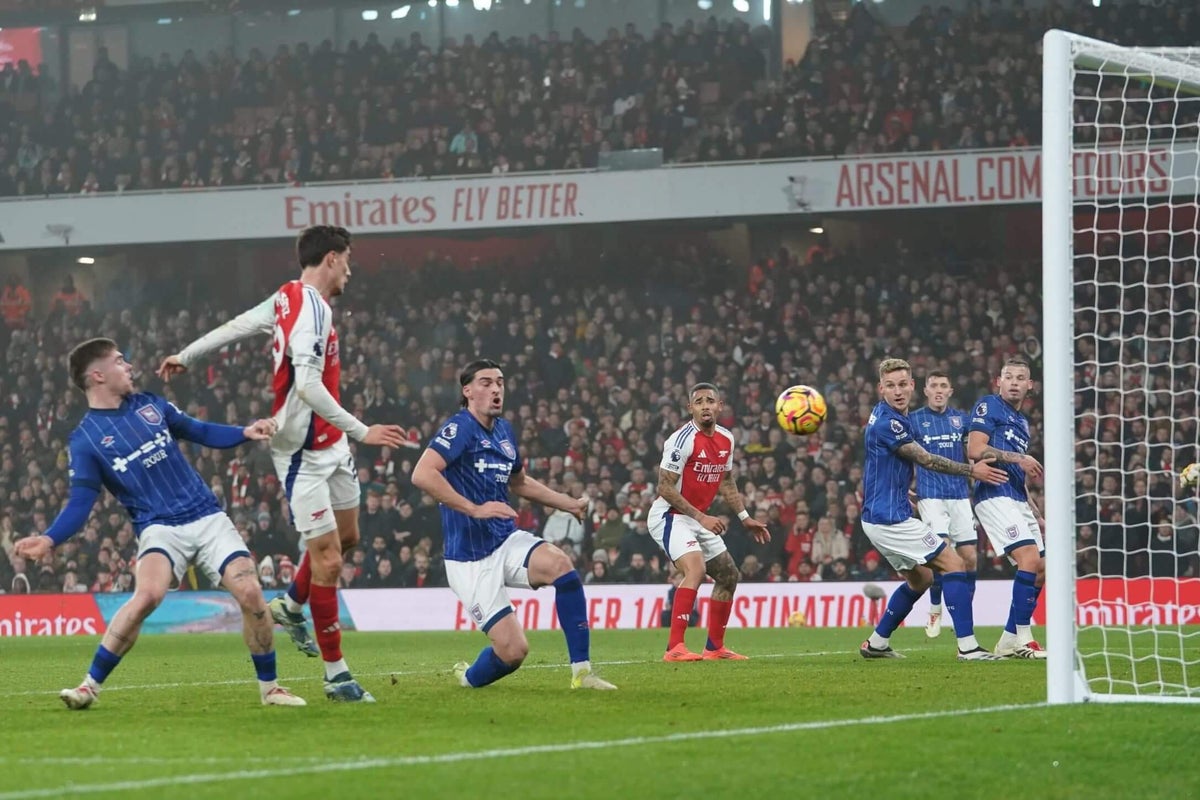Arsenal moved back to second in the Premier League after dominating possession and shots but scoring only once to beat Ipswich Town at the Emirates.
With Bukayo Saka ruled out for “many weeks” according to Mikel Arteta, Gabriel Martinelli started in his place and when his cross was cleared to Leandro Trossard on the left, he found Kai Havertz in the six-yard box to tap in after 23 minutes.
Arsenal controlled much of the game and Gabriel Magalhaes headed over a fine chance to make the game safe after an hour before Declan Rice had what would have been a fine volleyed goal from a corner blocked.
A second goal never came but the win reduced the gap at the top to six points.
Here Art de Roche breaks down the game’s key talking points.
The benefits of Havertz and Jesus — and why did Rice play No 6?
This was the second successive match in which Arteta started Gabriel Jesus and Havertz together, and the dynamics worked for Arsenal again.
The attack versus defence nature of the game was set early on, meaning Arsenal could benefit from an extra attacker in midfield rather than fielding two more domineering figures alongside the creative Martin Odegaard.
Both Havertz and Jesus were making runs into the six-yard box for the German’s opener.
Jesus attacking the front post, and Havertz the back, gave Leandro Trossard options and Ipswich Town problems. Ipswich packing the box could have frustrated Arsenal, but having another body high up helped generate more threat than in the goalless draw against Everton, for example.

Havertz, 29, is about to score the game’s first goal (Credit: Amazon)
These dynamics also see Declan Rice return to the base of midfield, rather than playing as a left-sided No 8. Arteta provided some insight on when he may play the England international in either position in his pre-match press conference, saying: “It depends. He’s going to play as a No 6 against a low block in relation to what the (opposition) No 9 does, if they stay with him or go with the centre-back.
“But against a team that presses high and the 10 is man marking him, he’s going to have another role, so it depends a lot as well on the behaviour of the opponent.”
Ipswich at home was a game that allowed Rice to be stable as a lone No 6. Even if there were moments when Ipswich played through Arsenal’s press, Havertz did well to track back. It also opened the game up, leading to chances like Jesus’ run in behind for a goal which was just slightly offside.
Why do Arsenal score so many six-yard box goals?
Havertz’s goal was Arsenal’s 13th inside the six-yard box this season. That is the highest number across the Premier League this season with Tottenham Hotspur (11) and Liverpool (10) closest to Arteta’s side.
A share of these will come from corners, all three of Gabriel’s goals this season for example. Even if they already rank first in this regard, more goals like Havertz’s will be welcome in the second half of the season.
Of course, chances from these areas will be of higher quality. That is likely why Arsenal are more considered in their approach play, always probing for an opening.
That tally could also represent another side of their game that can evolve, however. Four of Arsenal’s 32 Premier League goals this season have come from outside of the penalty area. In matches when the box is crowded with players waiting for a cross, creating more situations where shots can be taken from just outside the box could be useful.

Jurrien Timber did so at 0-0 in the first half, driving through midfield before shooting himself. Although his shot was saved, it asked the Ipswich backline a different question and opened up a space that wasn’t presented again in the game.
Arteta likes his team to maintain control for as long as possible, which contributes to scoring so many goals inside the six-yard box, but chaos similar to what was seen at Selhurst Park last week could help break games open a tad more.
How do Arsenal concede so few goals at home?
Arsenal seeing out that victory means they are the only team in the Premier League without a home defeat this season. They have won five and drawn three of their games at the Emirates this term, and are unbeaten in their last 11 home league matches in total.
Matches are rarely transitional at the Emirates, which will play its part. Like against Ipswich, Arsenal tend to be dominant from start to finish, with moments in between that need to be managed carefully.
Those moments were dotted throughout the second half against Ipswich, but David Raya was not put under any duress.

The match ending 1-0 means that Arsenal have kept four consecutive home clean sheets in the league for the first time since November/December 2021. Considering the goals that they were conceding earlier in the season that made games more frantic, like against Southampton and Leicester City, that was a much-needed development.
All this led to the travelling Ipswich fans chanting “Boring, boring Arsenal” in added time. The home crowd then responded with chants of “1-0 to the Arsenal” to bring a close to 2024 at the Emirates.
What next for Arsenal?
Wednesday, January 1: Brentford (away), Premier League, 5:30pm UK, 12:30pm ET
Recommended reading
(Top photo: Stephanie Meek – CameraSport via Getty Images)

